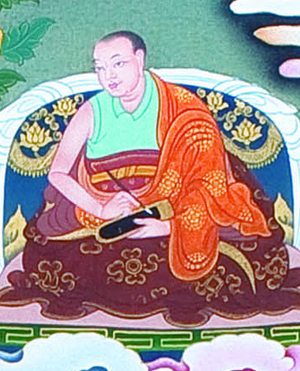Drokmi Lotsawa: Difference between revisions
mNo edit summary |
No edit summary |
||
| Line 1: | Line 1: | ||
[[File:Drokmi.png|thumb|Drokmi Lotsawa]] | [[File:Drokmi.png|thumb|Drokmi Lotsawa]] | ||
'''Drokmi Lotsawa Shakya Yeshe''' (Skt. ''Drokmi Śākya Yeshé''; Tib. བྲོག་མི་ལོ་ཙཱ་བ་ཤཱཀྱ་ཡེ་ཤེས་, [[Wyl.]] ''brog mi lo tsA wa shAkya ye shes'') (992-1072/1074) | '''Drokmi Lotsawa Shakya Yeshe''' (Skt. ''Drokmi Śākya Yeshé''; Tib. བྲོག་མི་ལོ་ཙཱ་བ་ཤཱཀྱ་ཡེ་ཤེས་, [[Wyl.]] ''brog mi lo tsA wa shAkya ye shes'') (992-1072/1074)<ref>Davidson has his dates as 993-1077. See Davidson, Ronald. Tibetan Renaissance: Tantric Buddhism in the Rebirth of Tibetan Culture. New York: Columbia University Press, 2005, page 164.</ref> —a great translator of the early [[Sarma]] period from Lhatsé in Western [[Tsang]], and an important master in the transmission of the [[Lamdré]] teachings to Tibet. He came from a nomadic family, which is reflected in his name ''drokmi''. | ||
One of the most important sources of the [[Sakya]] teachings is the great Indian master [[Virupa]] (9th century), who was one of the [[eighty-four mahasiddhas]]. His lineage passed through [[Gayadhara]] (994-1043) to his Tibetan disciple, Drokmi Lotsawa. In turn, Drokmi Lotsawa passed the lineage to his main disciple, [[Khön Könchok Gyalpo]] (1034-1102), founder of the Sakya school. [[Marpa]] Lotsawa also studied for fifteen years under the guidance of Drokmi Lotsawa, learning Sanskrit and other subjects. | One of the most important sources of the [[Sakya]] teachings is the great Indian master [[Virupa]] (9th century), who was one of the [[eighty-four mahasiddhas]]. His lineage passed through [[Gayadhara]] (994-1043) to his Tibetan disciple, Drokmi Lotsawa. In turn, Drokmi Lotsawa passed the lineage to his main disciple, [[Khön Könchok Gyalpo]] (1034-1102), founder of the Sakya school. [[Marpa]] Lotsawa also studied for fifteen years under the guidance of Drokmi Lotsawa, learning Sanskrit and other subjects. | ||
==Notes== | |||
<small><references/></small> | |||
==Further Reading== | ==Further Reading== | ||
Latest revision as of 11:34, 6 September 2018

Drokmi Lotsawa Shakya Yeshe (Skt. Drokmi Śākya Yeshé; Tib. བྲོག་མི་ལོ་ཙཱ་བ་ཤཱཀྱ་ཡེ་ཤེས་, Wyl. brog mi lo tsA wa shAkya ye shes) (992-1072/1074)[1] —a great translator of the early Sarma period from Lhatsé in Western Tsang, and an important master in the transmission of the Lamdré teachings to Tibet. He came from a nomadic family, which is reflected in his name drokmi.
One of the most important sources of the Sakya teachings is the great Indian master Virupa (9th century), who was one of the eighty-four mahasiddhas. His lineage passed through Gayadhara (994-1043) to his Tibetan disciple, Drokmi Lotsawa. In turn, Drokmi Lotsawa passed the lineage to his main disciple, Khön Könchok Gyalpo (1034-1102), founder of the Sakya school. Marpa Lotsawa also studied for fifteen years under the guidance of Drokmi Lotsawa, learning Sanskrit and other subjects.
Notes
- ↑ Davidson has his dates as 993-1077. See Davidson, Ronald. Tibetan Renaissance: Tantric Buddhism in the Rebirth of Tibetan Culture. New York: Columbia University Press, 2005, page 164.
Further Reading
- Cyrus Stearns, Luminous Lives: The Story of the Early Masters of the Lam 'bras Tradition in Tibet, Wisdom Publications, 2001, ISBN 978-0861713073